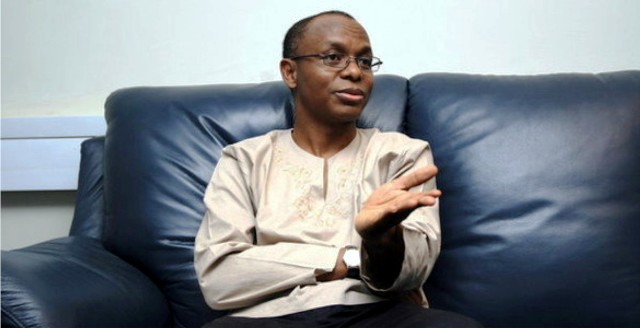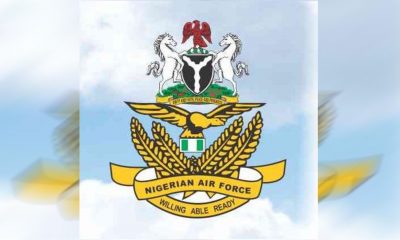Opinion
El-Rufai’s Wolf Cry For Igbos

As the 2019 general elections draw closer, politicians would want to utilize all available resources and strategies at their disposal to capture their prey, the vulnerable electorate. As a strategic means towards winning elections, enemies would suddenly become friends just to accomplish their aims. After all, in politics, there is no permanent friends, no permanent enemies, but interests.
The South East geo-political zone is visibly shortchanged in all ramifications; infrastructural development, participation in decision making, federal presence and security of lives and properties. Evidently, since after the civil war which ended merely in the field, the war remains intensive in the minds of many Nigerians leading to chronic ethnic hate, religious hurly-burly and marginalization, among others.
Despite the ill-treatment against the Igbos, the South East remains committed to nation building particularly through radical investment drives across the country and extension of hands of fellowship to non indigenes.
For instance, Dr. Orji Uzor Kalu appointed a northerner in his government while serving as the governor of Abia State. Similarly, Owelle Rochas Okorocha of Imo State overwhelmingly extended hands of friendship to the northerners in the state and provided them adequate protection.
Without a doubt, the South East, as attested to by the Kaduna State Governor, Mallam Nasir el-Rufai, is synonymous with marginalization since independence in 1960. Unfortunately, the same South East people were recently butchered mercilessly in Kaduna under the watch of Governor el-Rufai without any condemnation of the heinous crimes against humanity. Igbos have been targets of attacks in the north for several years, some in churches, houses and at business areas. Even young graduates on National Youth Service Corps (NYSC) scheme posted to the north were not spared, yet the new patriot feeling bad for the Igbos never condemned these attacks.
Without mincing words, el-Rufai owes the people of the South East geo-political zone unreserved apologies for all the innocent bloods of their relatives that have been wasted in his state and the north at large by his tribesmen before he could cry wolf over the lopsided appointment of the Federal government against the Igbos. To swiftly lament on the media against the marginalization of the Igbos by the Buhari administration, rather than draw the attention of the Federal Executive Council (FEC) to the ill treatments against the Igbos is political with sinister motives.
For the records, el-Rufai cannot overnight become aficionado of the Igbo nation more than President Buhari who in his two out of four attempts at the presidency picked Igbos; the late political scientist, Senator Chuba Okadigbo (2003) and Chief Edwin Ume-Ezeoke (2011) as his running mates.
Meanwhile, Mallam el-Rufai who has been in the corridors of power since Chief Olusegun Obasanjo’s administration in 1999 cannot show any instance of patriotism, let alone empowering the Igbos as he did to northerners while in government.
Furthermore, el-Rufai headed OBJ’s political squad then, that almost shattered the constitutional structure of government, to the extent that the nation’s former Vice President, Alhaji Atiku Abubakar was severally and openly disrespected, verbally attacked and almost gang-beaten at FEC meetings, leading to his tactical withdrawal from attendance till the end of that regime.
Thus, sometimes, while taking messages, the messenger ought to be cautiously scrutinized to ascertain the logic behind the profound messages. Without a doubt, the situation of things in the South East deserves a state of emergency and will inevitably play a crucial role in the next general elections.
If el-Rufai’s plots and calculations towards the 2019 are to grab the presidential ticket of any political party to contest against President Buhari, so as to scheme out the South East of the presidential race, he has goofed.
Meanwhile, the good message of Igbo marginalization may become a designed gizmo to unconsciously elongate the marginalization if care is not taken.
At this point in time, the best all northerners that feel concerned over some inadequacies of the present administration should do is to resourcefully and collectively rally around President Buhari and help him redress unfair policies, and not to run down the administration in the media with the intention to get sympathy from the zones that are facing marginalization, and thereby swapping Buhari with another northerner who would certainly go for another two terms.
To the public, Buhari represents the north on a geographical level; hence his success or failure will be accorded as that of the north, the same way it happened to Goodluck Jonathan.
Conclusively, for any northerner, sadly in the same APC, to become its critic overnight, there is certainly a sinister motive.
Umegboro, a public affairs analyst, lives in Abuja.
Carl Umegboro
Opinion
Why Reduce Cut-Off Mark for C.O.E ?
Opinion
Welcome! Worthy Future For R/S
Opinion
Restoring Order, Delivering Good Governance
The political atmosphere in Rivers State has been anything but calm in 2025. Yet, a rare moment of unity was witnessed on Saturday, June 28, when Governor Siminalayi Fubara and Minister of the Federal Capital Territory, Chief Nyesom Wike, appeared side by side at the funeral of Elder Temple Omezurike Onuoha, Wike’s late uncle. What could have passed for a routine condolence visit evolved into a significant political statement—a symbolic show of reconciliation in a state bruised by deep political strife.
The funeral, attended by dignitaries from across the nation, was more than a moment of shared grief. It became the public reflection of a private peace accord reached earlier at the Presidential Villa in Abuja. There, President Bola Ahmed Tinubu brought together Governor Fubara, Minister Wike, the suspended Speaker of the Rivers State House of Assembly, Martin Amaewhule, and other lawmakers to chart a new path forward.
For Rivers people, that truce is a beacon of hope. But they are not content with photo opportunities and promises. What they demand now is the immediate lifting of the state of emergency declared in March 2025, and the unconditional reinstatement of Governor Fubara, Deputy Governor Dr. Ngozi Odu, and all suspended lawmakers. They insist on the restoration of their democratic mandate.
President Tinubu’s decision to suspend the entire structure of Rivers State’s elected leadership and appoint a sole administrator was a drastic response to a deepening political crisis. While it may have prevented a complete breakdown in governance, it also robbed the people of their voice. That silence must now end.
The administrator, retired naval chief Ibok-Ette Ibas, has managed a caretaker role. But Rivers State cannot thrive under unelected stewardship. Democracy must return—not partially, not symbolically, but fully. President Tinubu has to ensure that the people’s will, expressed through the ballot, is restored in word and deed.
Governor Fubara, who will complete his six-month suspension by September, was elected to serve the people of Rivers, not to be sidelined by political intrigues. His return should not be ceremonial. It should come with the full powers and authority vested in him by the constitution and the mandate of Rivers citizens.
The people’s frustration is understandable. At the heart of the political crisis was a power tussle between loyalists of Fubara and those of Wike. Institutions, particularly the State House of Assembly, became battlegrounds. Attempts were made to impeach Fubara. The situation deteriorated into a full-blown crisis, and governance was nearly brought to its knees.
But the tide must now turn. With the Senate’s approval of a record ?1.485 trillion budget for Rivers State for 2025, a new opportunity has emerged. This budget is not just a fiscal document—it is a blueprint for transformation, allocating ?1.077 trillion for capital projects alone. Yet, without the governor’s reinstatement, its execution remains in doubt.
It is Governor Fubara, and only him, who possesses the people’s mandate to execute this ambitious budget. It is time for him to return to duty with vigor, responsibility, and a renewed sense of urgency. The people expect delivery—on roads, hospitals, schools, and job creation.
Rivers civil servants, recovering from neglect and under appreciation, should also continue to be a top priority. Fubara should continue to ensure timely payment of salaries, address pension issues, and create a more effective, motivated public workforce. This is how governance becomes real in people’s lives.
The “Rivers First” mantra with which Fubara campaigned is now being tested. That slogan should become policy. It must inform every appointment, every contract, every budget decision, and every reform. It must reflect the needs and aspirations of the ordinary Rivers person—not political patrons or vested interests.
Beyond infrastructure and administration, political healing is essential. Governor Fubara and Minister Wike must go beyond temporary peace. They should actively unite their camps and followers to form one strong political family. The future of Rivers cannot be built on division.
Political appointments, both at the Federal and State levels, must reflect a spirit of fairness, tolerance, and inclusivity. The days of political vendettas and exclusive lists must end. Every ethnic group, every gender, and every generation must feel included in the new Rivers project.
Rivers is too diverse to be governed by one faction. Lasting peace can only be built on concessions, maturity, and equity. The people are watching to see if the peace deal will lead to deeper understanding or simply paper over cracks in an already fragile political arrangement.
Wike, now a national figure as Minister of the FCT, has a responsibility to rise above the local fray and support the development of Rivers State. His influence should bring federal attention and investment to the state, not political interference or division.
Likewise, Fubara should lead with restraint, humility, and a focus on service delivery. His return should not be marked by revenge or political purges but by inclusive leadership that welcomes even former adversaries into the process of rebuilding the state.
“The people are no longer interested in power struggles. They want light in their streets, drugs in their hospitals, teachers in their classrooms, and jobs for their children. The politics of ego and entitlement have to give way to governance with purpose.
The appearance of both leaders at the funeral was a glimpse of what unity could look like. That moment should now evolve into a movement-one that prioritizes Rivers State over every personal ambition. Let it be the beginning of true reconciliation and progress.
As September draws near, the Federal government should act decisively to end the state of emergency and reinstate all suspended officials. Rivers State must return to constitutional order and normal democratic processes. This is the minimum requirement of good governance.
The crisis in Rivers has dragged on for too long. The truce is a step forward, but much more is needed. Reinstating Governor Fubara, implementing the ?1.485 trillion budget, and uniting political factions are now the urgent tasks ahead. Rivers people have suffered enough. It is time to restore leadership, rebuild trust, and finally put Rivers first.
By: Amieyeofori Ibim
Amieyeofori Ibim is former Editor of The Tide Newspapers, political analyst and public affairs commentator
-

 News13 hours ago
News13 hours agoNAF Disowns Recruitment Adverts, Says It’s Fake
-
Rivers14 hours ago
Okrika Administrator Seeks To Connect Okujagu Ama To National Grid … Donates 30 Life Jackets To Okujagu Ama Boat Drivers
-
News11 hours ago
Rivers Chief Judge Frees 21 Awaiting Trial Inmates
-
Politics14 hours ago
Natasha’s Counsel Writes Senate Over Court Judgment
-
Nation13 hours ago
NIPR Practitioners Urge To Go Beyond Traditional Media Relations To Strategic Leadership Functions
-
Politics14 hours ago
Bayelsa APC Hails Late Buhari As Change Agent In Nigerian Politics
-
News11 hours ago
South-South contributes N34trn to Nigeria’s economy in 2024 – Institute
-
Niger Delta14 hours ago
Police Rescue Kidnap Victim, Recover Pistol In A’Ibom

